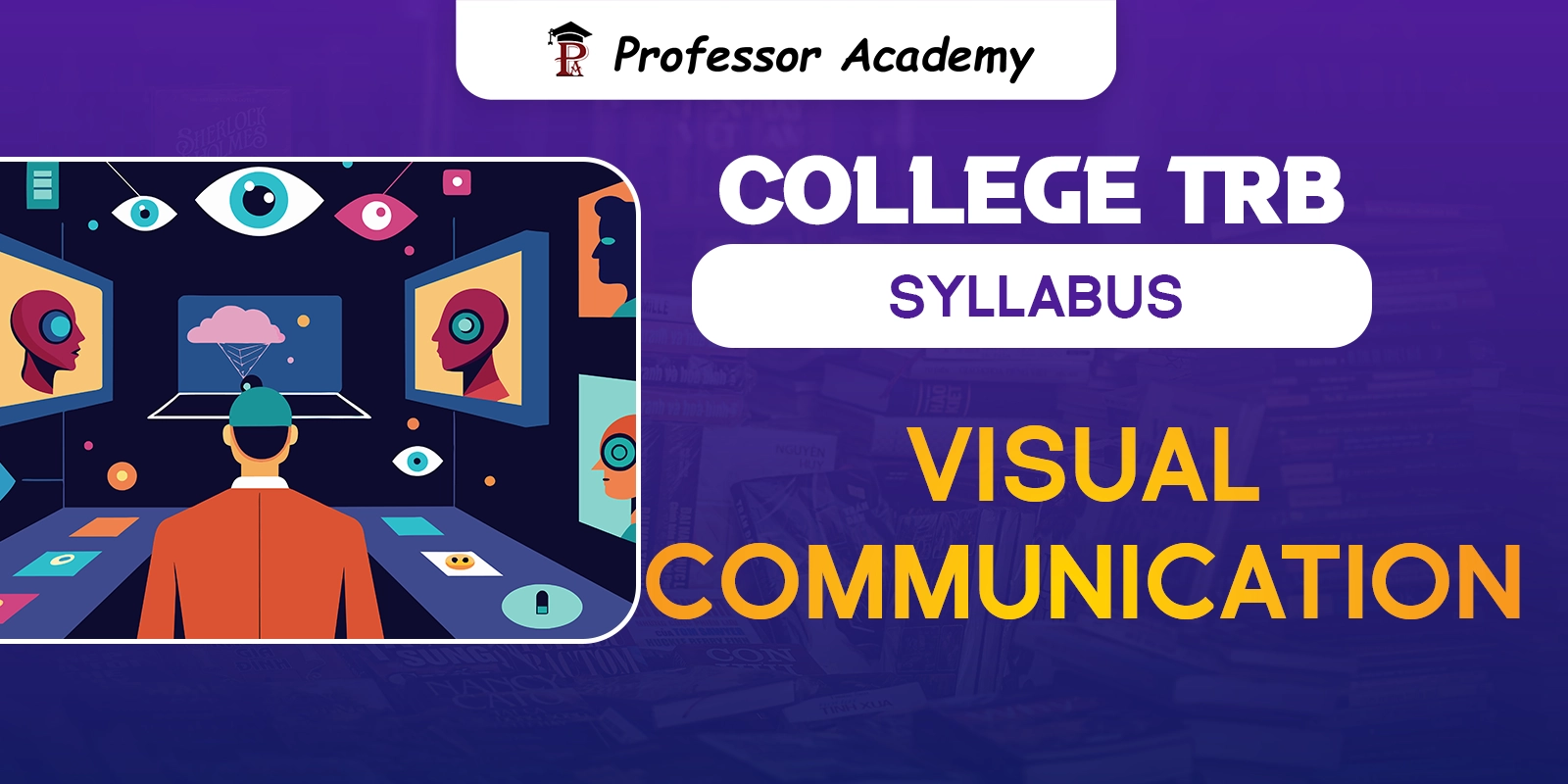Introduction
The TN TRB Assistant Professor Visual Communication Syllabus is designed to assess candidates’ creative, technical, and theoretical understanding of media and communication studies. Released by the Tamil Nadu Teachers Recruitment Board (TRB), this syllabus covers a wide range of topics such as communication theories, media production, advertising, journalism, photography, film studies, and new media technologies. Aspirants preparing for this exam can use the syllabus as a clear guide to plan their preparation effectively and gain a deeper understanding of the evolving world of visual communication.
TN TRB Assistant Professor Syllabus – VISUAL COMMUNICATION
Unit–1 :
Communication – Definition, Functions, Elements, Models, Types; Human Communication–Verbal and Non-verbal Communication; Barriers of Communication; Visual Communication, Types, Elements, Perception, Illusion, Gestalt’s Theory, Gestalt’s Principles.
Unit–2 :
Visual Analysis – Semiotics – Saussure, Peirce, Barthes; Psychoanalysis–Freud, Lacan, Jung; Feminism – Laura Mulvey; Marxism – Marx, Gramsci, Althusser; Post-modernism – Derrida, Baudrillard.
Unit–3 :
Drawing – Principal Elements; RGB, CMYK; Principles of Design and Composition; Iconology, Formalism; Painting Movements; Theories of Rasa; Indian Schools of Art; Design Software – Flash, Dreamweaver, Photoshop, Coreldraw;
2D Animation–Drawing and Painting Tools, Manipulating Objects.
Unit–4 :
3D Animation – Standard and Extended Primitives, Material Editor, Modifier, Modeling, Special Effect; Matte Extraction, Colour Correction, Rendering, Rotoscopy; VFX Basics, Editing – Types, Using AVID, FCP.
Unit–5 :
Photography – Types of Camera, Parts and Functions of Camera, Depth of Field, Aperture, Exposure, Focus, Rule of Third, Golden Mean; Videography – Types of Camera, Camera Shot, Angle, Movement; While Balance, Colour Temperature; Types of Lens, Aspect Ratio, Framing.
Unit–6 :
Editing Techniques – Continuity Editing, Montage, Rules of Editing; Radio and Television Production – Formats, Genres, Three Stages of Production; Podcasting; Scriptwriting – Story, Plot, Treatment, Three-Act Structure, Freytag’s Pyramid, Basic Types of Stories.
Unit–7 :
Audiography – Nature of Sound, Frequency, Wavelength, Amplitude; Acoustic Materials, Echo, Noise Control;
Types of Mics, Dubbing, Live Recording, Equalizer, Protocol; Advertising – Definition, Strategies, Unique Selling Proposition, Promotional Mix, Campaign.
Unit–8 :
Copywriting, Event Management, Public Relations; Media Laws and Ethics – Copyrights, Privacy, Slander; Right to Information Act, Prasar Bharati Act, Information Technology Act, Intellectual Property Rights; Censorship Laws,
Cyber Laws.
Unit–9 :
Film Studies – History of Early Cinema – Lumiere Brothers, Edqin S Porter, George Melies, D W Griffith; German Expressionism, French Impressionism, Surrealism, Soviet Montage Cinema, Hollywood Studios, Italian Neo-realism, French New Wave.
Unit–10 :
Indian Cinema – Early Cinema, Mythologicals, Socials, New Wave, Hindi Cinema; Tamil Cinema – Major Directors, Prominent Films; Documentary; Film Techniques, Genres, Stylistics; Deep Focus Photography, Long Take, One-point Perspective.
Conclusion
The Visual Communication syllabus for the TN TRB Assistant Professor exam helps candidates focus on both conceptual knowledge and practical media skills. With proper preparation and consistent effort, aspirants can perform confidently in the exam and move closer to a rewarding teaching career in media and communication. This syllabus not only highlights what to study but also encourages a creative and analytical approach to understanding modern communication systems.
Download: TN TRB Assistant Professor Syllabus – VISUAL COMMUNICATION https://professoracademy.com/wp-content/uploads/2025/10/VISUAL-COMMUNICATION.pdf
Join our College TRB Tamil Eligibility & Descriptive Paper Coaching:https://professoracademy.com/courses/tn-trb-assistant-professor-tamil-eligibility-paper-2-only/
Join Our College TRB Coaching: https://professoracademy.com/product-category/college-trb
Enrol Now!
Contact Us : +91 7070701005 / +91 7070701009 / +91 8124408794 / +91 7550100920


